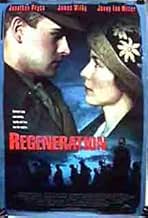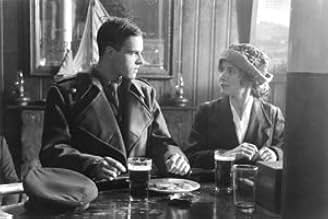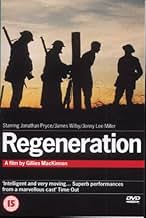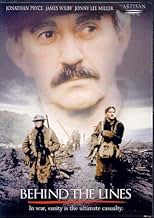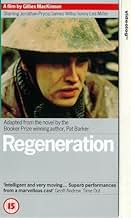Füge eine Handlung in deiner Sprache hinzuBased on Pat Barker's novel of the same name, "Regeneration" tells the story of soldiers of World War One sent to an asylum for emotional troubles. Two of those soldiers are England's most i... Alles lesenBased on Pat Barker's novel of the same name, "Regeneration" tells the story of soldiers of World War One sent to an asylum for emotional troubles. Two of those soldiers are England's most important WW1 poets.Based on Pat Barker's novel of the same name, "Regeneration" tells the story of soldiers of World War One sent to an asylum for emotional troubles. Two of those soldiers are England's most important WW1 poets.
- Regie
- Drehbuch
- Hauptbesetzung
- Nominiert für 1 BAFTA Award
- 17 Nominierungen insgesamt
Empfohlene Bewertungen
The opening aerial shot of the bloody consequences of battle are every bit the emotional and visceral equal of Spielberg's lauded 20-minute opening sequence in Saving Private Ryan. The rest of the film - in my opinion - surpasses Ryan as a whole in terms of its drama, poetry, anguish and thought.
The performances are outstanding. Jonathan Pryce's portrayal of Rivers falling apart at the seams as he adopts the neuroses and trauma of his patients is astonishing. Johnny Lee Miller is also excellent as the (initially) mute soldier, haunted by the brutality of a trench-attack. James Wilby's Siegfried Sassoon is perhaps the toughest role to play in the film and yet he surpasses any prior (or subsequent) performances with a characterisation that swings from harsh to likeable, strong to weak, right to wrong.
All of the numerous storylines are well constructed and followed to their natural conclusion. There are no false avenues; no bum notes; no waste.
The source material is beautifully adapted for the film (by the rare breed of writer-producer, Allan Scott), losing none of its pace or characterisation. The emotional weight so prominent in Barker's novel are perfectly transferred into the movie. How wonderful for a modern film to have non-stereotypical, imperfect lead characters and lack easy conclusions. How beautifully evoked is the friendship between Sassoon and Owen. There is no sacharine sentiment in this movie; nor artificial shock to induce pity; nor a wasted scene or moment of dialogue. Equally, the period look of the film is stunning. Filmed in Scotland, the vistas are beautifully bleak and wintry. The atmosphere of the First World War is all too frighteningly real.
The music, whilst beautiful, is perfectly restrained. Harking back to the films of the seventies, long moments of silence pervade Regeneration. How did things go so badly wrong in the last twenty years in this respect?
Regeneration achieves the very rare distinction of matching (if not surpassing) the beautiful and moving novel on which it is based. Thoughtful film-goers should treat themselves to this wonderful and intelligent film.
Regeneration is a thoughtful anti-war film where the paradox of war is implied in a Scottish hospital for the treatment of shell shocked officers. The doctor has to get them well so they can be returned to the front lines, where they will more than likely be killed. The script is intelligent and the acting is superb. There are some allegorical scenes which do more to underscore the pigheaded arrogant mentality of the "establishment" which continued a war until quite simply, there was no one left to fight. Even sick men with TB were sent off to fight. Perhaps the saddest aspect of watching this film is when you realize that WWII began 21 years after the first once ended, just long enough for the new generation of soldiers to grow up.
James Wilby gives a remarkable performance as an officer who is sickened by the war that he sees around him. He isn't so much mentally ill as disgusted with war and his contribution in it. Jonny Lee Miller is also amazing in his portrayal of an officer driven mute. When he discovers his voice he is angry and argumentative, but slowly we discover that all of his anger is a shell to protect the hurt that has built up inside of him.
One of the biggest underlying themes in this film is how useless war is, even if it is for the right cause. Mainly because it destroys the human psyche and removes hope.
This is a startling film, and touching and emotional. It cuts to the core of who we all are, as human beings.
intelligent scenario which passes messages about how horrific war is
to the audience in the mildest yet touching way I've seen.
The story involves a hospital in Scotland where officers are sent when
they suffer a breakdown, a common phenomenon in the first and second
world wars. In there, a doctor (played by Jonathan Pryce) attempts to
treat his patients in a more humane way than the one other doctors of
the time choose. Through the stories of characters in the hospital --
including Siegfried Sassoon and Wilfred Owen, two poets who happen to
meet and become friends in the hospital -- the life of the British
soldiers in the first World War, as well as several political messages
about that affecting era for humanity are successfully transmitted to
the audience, without blood, without effects or huge battle scenes in
a way that touches and indicates its significance more than any other
film I've seen about the subject.
The performances are excellent, with Johny Lee Miller -- who apart
from this movie has not shown any signs of serious acting that I've
seen -- delivering a very good performance of a shocked and ambitious
officer and Jonathan Pryce metaphorically accepting the ideas of
Sassoon -- who opposes to the war after a point where he realises its
futility and the lack of values in the politicians driving it -- can
be though as the link between the soldiers and humanity itself.
It is definitely a movie I would recommend! Excellent.
Wusstest du schon
- WissenswertesThe film used a lot of present and former Territorial Army soldiers as extras for larger scenes. This includes soldiers from 52nd Lowland, 6th Battalion Royal Regiment of Scotland, located in Hotspur street, Glasgow.
- PatzerThe camera and the crane on which it is suspended are reflected in several puddles during the very opening shot (of the battlefield).
- Zitate
Capt. William Rivers: I find it interesting that you don't stutter.
Billy Prior: I find it even more interesting that you do.
- Alternative VersionenReleased in the USA in a 96 minute version under the title "Behind the Lines".
- VerbindungenFeatured in The 100 Greatest War Films (2005)
- SoundtracksJust Before The Battle, Mother
Words and Music by George Frederick Root (As G.F. Root)
Performed by Craig Titus
Top-Auswahl
- How long is Regeneration?Powered by Alexa
Details
- Erscheinungsdatum
- Herkunftsländer
- Sprache
- Auch bekannt als
- Krigets dårar
- Drehorte
- Overtoun House, Dumbarton, West Dunbartonshire, Schottland, Vereinigtes Königreich(Craiglockhart Hospital)
- Produktionsfirmen
- Weitere beteiligte Unternehmen bei IMDbPro anzeigen
Box Office
- Bruttoertrag in den USA und Kanada
- 33.131 $
- Eröffnungswochenende in den USA und in Kanada
- 19.593 $
- 16. Aug. 1998
- Weltweiter Bruttoertrag
- 33.131 $


